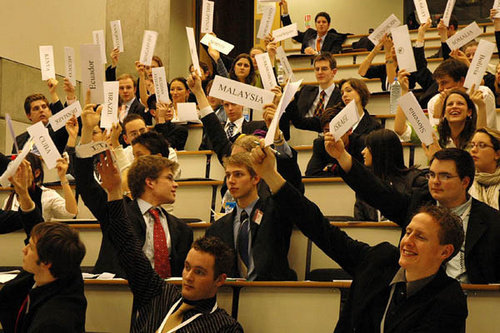
Don't Be Afraid to Speak -- Stand Out
When I started doing Model UN, my advisor would say that the number one fear in America is public speaking – and number two is death. More people would rather die than make a speech.
And as a high school freshman, I was afraid to speak. Whenever the chair asked for speakers, I would hesitate before raising my placard. I waited for other delegates to volunteer first. Then, lost in the throng of outstretched hands, I would finally raise mine – and not get called on.
It felt safer to blend into the crowd. But it also made me anonymous, and anonymity does not win awards. By definition, awards recognize delegates who distinguish themselves in committee – delegates who do not blend into the crowd.
In the moment of hesitation before raising my placard, my biggest fear was not knowing what to say. This is typical for many delegates, since most Model UN speeches have to be improvised quickly, particularly comments.
With that in mind, here are 3 tips on figuring out what to say in a speech:
1. Focus on one idea.
Most delegates try to say too much in a single speech. Speaking time is typically one minute or less, which is barely enough time to say one thing well. Most delegates try to run through a laundry list of facts or points, but no single thing sticks in the minds of their audience.
It’s a problem of information overload. There’s a lot going on in committee – giving speeches, making motions, drafting resolutions. It’s an overwhelming amount of information to process, both for the committee and you as an individual delegate trying to make a speech.
Focusing on one idea is a way to pierce through this haze of information. It can be your topic framework, a specific issue, or just saying “I disagree” with another delegate’s speech. But when you focus on one idea, you are inviting the committee to focus on this one idea with you. Your challenge is to pick out one idea from the swirling mass of possible things to speak on.
For example, In speeches defending a resolution on which you are a sponsor, single out one operative clause – either the most important or most controversial – and focus all of your speaking time on it.
2. Use a framework.
After you’ve decided what idea to focus on, build a framework around it. Break down your one idea into a specified number of bullet points. Structure your speech so that it’s logical and organized.
Framing makes it easier for the committee to understand what you’re saying. Using a structure helps you look like you know what you’re talking about. Other delegates are then more likely to remember what you’ve said. Hopefully, they use your framework in their own speeches and refer back to you. It not only makes you look good – it highlights you as a committee leader.
Using the example in the previous tip, after you choose one operative clause to focus on, speak on the top 3 reasons that this clause is important. Consider how it impacts your topic. Or perhaps it needs to be included in the resolution because of a compromise between different caucus blocs.
Here are more Best Delegate articles on framing in general and framing your topic.
3. Persuade, don’t just describe.
Most delegates spend too much speaking time reciting facts instead of arguing a point. This is commonly found in opening speeches that feature statistics and stories related to the committee’s topic. These might serve as good introductions, but other delegates and the dais staff already have this information in their research. They now want to hear your ideas on what to do about the problem and why.
The committee does not remember your speeches for the statistics or stories you tell, but rather the one idea your speech was about and how you made everyone feel while talking about it. Whenever you make a speech, you want other delegates to think to themselves, “That’s a good point.” And when you get really good, they’ll think, “Wow – I wish I said that.”
Continuing the example above, it’s not enough to describe what your operative clause does. You must explain why it is important to the committee. One way to do this is by referring to other delegates’ prior speeches and pointing out that your operative clause addresses their concerns.
* * *
To win awards, you have to stand out. Public speaking is essential to standing out, and you cannot let fear stop you from making speeches. So, to win awards, you have to overcome any fears of public speaking you might have. You have to know what to say.
How do you know what to say in a speech? Tell us in the comments!
Photo Credit: William & Mary International Relations Club


